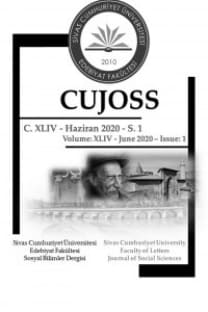PREDICTING THE SCHOOL ENGAGEMENT OF HIGH SCHOOL STUDENTS WITH DIFFERENT RELIGIOUS BELIEFS AND RESEARCH INTO THE MEDIATING EFFECT OF SOME VALUES ON SCHOOL ENGAGEMENT
Öz
In this
research, school engagement of students with different religious beliefs and the
mediating effect of some values on this engagement were studied. Data was
gathered from junior and senior students of two Anatolian high schools on the
Asian side and two Anatolian high schools on the European side in İstanbul. In
total, data was gathered from 432 students. School Engagement Scale,
Religiosity Scale and Values Scale were used in this study. It was found that
four types of religious beliefs differ in terms of school engagement: There is
a meaningful and positive correlation between Sunni Islam, Fundamentalism
(Radical Islamic belief) and school (community) engagement. There is a meaningful and negative
correlation between atheism and school engagement. There is no meaningful
correlation between heterodox religiosity and school engagement.
Furthermore, a strong relationship
was determined between all sub-dimensions of school engagement and tradition
and universality values. Also, only tradition value was found to have a
mediating effect on the relationship between having Sunni Islamic belief, radical
Islamic belief, atheism and the dimensions of school engagement. As a result, tradition
and universality values and Sunni Islamic belief were determined to be influential
in school engagement of high school students and their socialization for
Turkish Education System. Tradition value was observed to be more influential
compared to others.
Anahtar Kelimeler:
Religion and Values Education in Turkey, Socialization, School Engagement
___
Andrei, T., Teodorescu, D., & Oancea, B. (2012). Quantitative methods used to identify the causes of school dropout in EU countries. Procedia-Social and Behavioral Sciences 31, 188-192.Arastaman, G. (2006). Ankara ili lise birinci sınıf öğrencilerinin okula bağlılık durumlarına ilişkin öğrenci, öğretmen ve yöneticilerin görüşleri. Ankara: Unpublished dissertation, Ankara University Institute of Educational Sciences.Bacanlı, H. (2002) Değer tercihleri: Psikolojik kavram analizleri. Ankara: Nobel Yayın DağıtımBaron, R. M., & Kenny, D. (1986). The moderator-mediator variable distinction in social psychological research: Conceptual, strategic and statistical considerations. Journal of personality and social psychology, 51, 1173-1182.Bevan, R. (2011). The Question of Conscientiousness and Religious Engagement in Public Schools. Study Philosophy Education, 30, 257-269.Can, S. (2008). İlköğretim ikinci kademe öğrencilerinin okula bağlılık düzeylerinin bazı değişkenlere göre incelenmesi. Ege University Institute of Social Sciences: Unpublished dissertation.Çiçek, S. A. (2008). Dindarlık ile saldırganlık arasındaki etkileşimin terör yönetimi kuramı çerçevesinde incelenmesi. Mersin: Unpublished dissertation, Mersin University Institute of Social Sciences.Fredricks, J., Blumenfeld, P., & Paris, A. (2004). School engagement: Potential of the concept, State of the Evidence. Rewiev of Educational Research,74, 59-109.Gökşen, F., & Zeynep, C. (2010). Social Capital and cultural distance as predictors of early school dropout: Implications for community action for Turkish internal migrants. International Journal of Intercultural Relations 34, 163-175.Gökşen, F., Cemalcilar, Z., & Gürlesel, C. (2006). Türkiye'de ilköğretim okullarında okulu terk ve izlenmesi ile önlenmesine yönelik politikalar. http://erg.sabanciuniv.edu/sites/erg.sabanciuniv.edu/files/A%C3%87EV_Okulu%20Terk%20Raporu.pdf downloaded on 20.01.2013 from the website given above.İsabelle Archambault, M. J.-S., Janosz, m., Fallu, J.-S., & Pagani, L. S. (2009). Student engagement and its relationship with early high school dropout. Journal of Adolescence 32, 651-670.Kaya, N. (2011). Türkiye'nin eğitim sisteminde azınlıklar ve ayırımcılık: Kavramsal çerçeve ve temel sorunlar. http://www.secbir.org/wp-content/uploads/2011/01/18-NURCAN-KAYA.pdf downloaded on 14.02.2013 from the website given above.Kaymakcan, R. (2006). Türkiye'de din eğitimi politikaları hakkında düşünceler. http://www.dem.org.tr/makaleler/dinegitimi_recep_06072006_EKEV.pdf, adresinden downloaded on 14.02.2013 from the website given above.Kaymakcan, R., & Meydan, H. (2010). Demokratik vatandaşlık ve din öğretimi: yeni yaklaşımlar ve Türkiye'de DKAB dersleri bağlamında bir değerlendirme. İ.Ü.İlahiyat Fakültesi Dergisi, Bahar 2010, 1 (1), 29-53.Kirazoğlu, C. (2009). The investigation of school-dropout at the secondary level of formal education: the stated reasons by the school administrators and school counselors: a preliminary study. Procedia-Socail and Behavioral Sciences, 1, 905-914.Kızmaz, Z. ( 2005). Sosyolojik suç kuramlarının suç olgusunu açıklama potansiyelleri üzerine bir değerlendirme. C.Ü. sosyal bilimler dergisi, Aralık, 29, (2), 149-174.Kızmaz, Z. (2004). Öğrenim düzeyi ve suç: Suç-okul ilişkisi üzerine sosyolojik bir araştırma. Fırat Üniversitesi Sosyal Bilimler Dergisi, c.14, s.2, 291-319.Kusdil, E. M., Kağıtçıbası, Çiğdem., (2000). “Türk Öğretmenlerin Değer Yönelimleri ve Schwartz Değer Kuramı”, Türk Psikoloji Dergisi, 15 (45).Martin, A. J. (2008). Enhancing student motivation and engagement: The effects of a multidimensional intervention. Contemporary Educational Psychology, 33, 239-269.Okçu, D. (2009). Türk Eğitim Sistemi'nde Din Öğretiminin Zorunluluğu Sorunu. Uluslar Arası Eğitim Felsefesi Kongresi (International Congress on Philosphy of Education (s. 215-226). Ankara: http://www.egitimbirsen.org.tr/yayinlarimiz/231-egitimbirsen.org.tr-231.pdf downloaded on 14.02.2013 from the website given above.Osterman, F. (2000). Students’ Need for Belonging in the School Community. Review of Educational Research, 17 (3), 323-367.Özer, A., Gençtanırım, D., & Ergene, T. (2011). Türk lise öğrencilerinde okul terkinin yordanması: Aracı ve etkileşim değişkenleri ile bir model testi. Eğitim ve Bilim, 36, (161), 302-317.Raporu, 2. U. (2008). 2008 Uluslararası Din Özgürlüğü Raporu. Ankara: http://turkish.turkey.usembassy.gov/din_ozgurlugu_2008.html, downloaded on 14.02.2013 from the website given above.Sarıkaya, S. (2001). Türkiye'de din anlayışı. http://www.msaffets.com/wp-content/uploads/Din-Anlay%C4%B1%C5%9F%C4%B1.pdf, downloaded on 14.02.2013 from the website given above.Sheppard, S. L. (2011). School Engagement: A Dance Macabre? Journal of Philosophy of Education, Vol.45, No.1, 111-123.Strike, K. A. (2007). Common Schools and Uncommon Conversations: Education, Religious Speech and Public Spaces. Journal of Philosophy Of Education, Vol.41, No.4, 693-708.Türk-İş. (2006). Çalışan çocukların sorunları ve çözüm yolları. downloaded on 23.01.2013 http://www.turkis.org.tr/source.cms.docs/turkis.org.tr.ce/docs/file/cc103.pdf from the website given above.Uncu, Ü. (2008). Öğretmen ve Eğitim Yöneticilerinin Değer Yönelimlerinin Çok Boyutlu Olarak İncelenmesi (İstanbul ili örneği). Yeditepe University Institute of Social Sciences:, İstanbul: Unpublished dissertation.Yetim, Ü. (2000). Bir kavramsallaştırma denemesi: dini kategorilerin alt kültür oluşumuna etkisi. Psikoloji Semineri, 12, 123-127, Mersin. http://dogm.meb.gov.tr/www/yasal-dayanaklarimiz/icerik/9. (tarih yok). http://dogm.meb.gov.tr/www/yasal-dayanaklarimiz/icerik/9, downloaded on 14.02.2013 from the website given above.. http://mevzuat.meb.gov.tr/html/88.html. (tarih yok). Milli Eğitim Temel Kanunu. http://mevzuat.meb.gov.tr/html/88.html downloaded on 20.02.2013 from the website given above.
- ISSN: 1305-5143
- Yayın Aralığı: Yılda 2 Sayı
- Yayıncı: Sivas Cumhuriyet Üniversitesi Edebiyat Fakültesi
